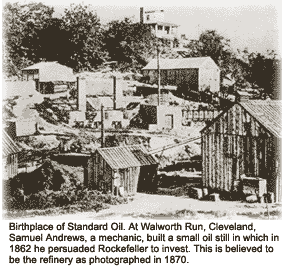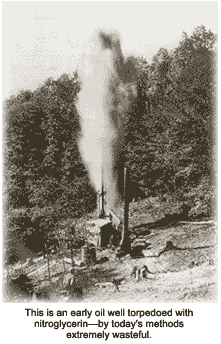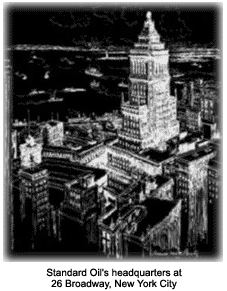The Standard Oil Trust was formed in 1863 by John D. Rockefeller. He built up the company through 1868 to become the largest oil refinery firm in the world. In 1870, the company was renamed Standard Oil Company, after which Rockefeller decided to buy up all the other competition and form them into one large company.
 The company faced legal issues in 1890 following passage of the Sherman Antitrust Act. That also brought unwanted attention to the company by Ida M. Tarbell, a McClure's Magazine reporter, who began an investigation. Following publication of her report, the Standard Oil Company was forced to break up into separate state companies — the "Seven Sisters" — each with its own board of directors.
Background
The Standard Oil Trust had quickly become an industrial monster. The trust had established a strong foothold in the U.S. and other countries in the transportation, production, refining, and marketing of petroleum products.
Early on, Rockefeller and partners attempted to make money on the home lighting market, converting whale oil to kerosene. Gasoline had been nearly worthless up to 1911. However, with a growing demand for "juice" needed to power the newly emergent automobile, Standard Oil Trust's moneybags began to bulge.
The Trust broke up in 1911, which led to the skyrocketing of the trust's stock prices. Some historians contend that the breakup of Standard Oil closely resembles the more modern monopoly breakup of AT&T and the Bell Telephone System.
Like the telephone industry’s "Baby Bells," many of big oil’s "Baby Standards" kept the old company name as they went into business for themselves. However, if a company separated on its own, it was restricted from using the "Standard" brand. Just as Bell had accomplished later on in its history, the Standards soon rose up to dominate the market, becoming more valuable than the original trust.
The company faced legal issues in 1890 following passage of the Sherman Antitrust Act. That also brought unwanted attention to the company by Ida M. Tarbell, a McClure's Magazine reporter, who began an investigation. Following publication of her report, the Standard Oil Company was forced to break up into separate state companies — the "Seven Sisters" — each with its own board of directors.
Background
The Standard Oil Trust had quickly become an industrial monster. The trust had established a strong foothold in the U.S. and other countries in the transportation, production, refining, and marketing of petroleum products.
Early on, Rockefeller and partners attempted to make money on the home lighting market, converting whale oil to kerosene. Gasoline had been nearly worthless up to 1911. However, with a growing demand for "juice" needed to power the newly emergent automobile, Standard Oil Trust's moneybags began to bulge.
The Trust broke up in 1911, which led to the skyrocketing of the trust's stock prices. Some historians contend that the breakup of Standard Oil closely resembles the more modern monopoly breakup of AT&T and the Bell Telephone System.
Like the telephone industry’s "Baby Bells," many of big oil’s "Baby Standards" kept the old company name as they went into business for themselves. However, if a company separated on its own, it was restricted from using the "Standard" brand. Just as Bell had accomplished later on in its history, the Standards soon rose up to dominate the market, becoming more valuable than the original trust.
 Competition and a dynasty breakup
More and more Standard Oil companies were becoming common across the country, without the venerable Standard name — often adopting the names of smaller oil companies they purchased. With national attention in the form of mass-advertisement underway, other Standards expanded into those same marketing areas. That resulted in various Standard organizations "at war" in an all-out battle for turf and the consumer.
Standard Oil was declared a monopoly following several ugly court battles, which eventually broke up the dynasty. Many company assets had to be divided among the companies. One of those was the nationally recognized "Standard" brand name. The smaller emerging oil companies generally used the popular "Red Crown" and "White Crown" labels —without the displaying the Standard label.
When ethyl alcohol became available as an additive to gasoline, most Standards adopted it. That new form of petroleum contributed to increasing benchmarks of excellence for those newly forming fuel stations. The new ethyl product increasingly helped such Standard companies as Vacuum's Mobiloil, as well as Esso Motor Oil's worldwide distribution.
Forming the TBA and Standard Oil today
In 1930, the former Standards banded together to form the Atlas Corporation, which stormed into the manufacture of Tires, Batteries, and Accessories (TBA). Those products were then distributed to Standard Oil and Standard-related stations of all denominations, from the Pacific to the Atlantic.
Competition and a dynasty breakup
More and more Standard Oil companies were becoming common across the country, without the venerable Standard name — often adopting the names of smaller oil companies they purchased. With national attention in the form of mass-advertisement underway, other Standards expanded into those same marketing areas. That resulted in various Standard organizations "at war" in an all-out battle for turf and the consumer.
Standard Oil was declared a monopoly following several ugly court battles, which eventually broke up the dynasty. Many company assets had to be divided among the companies. One of those was the nationally recognized "Standard" brand name. The smaller emerging oil companies generally used the popular "Red Crown" and "White Crown" labels —without the displaying the Standard label.
When ethyl alcohol became available as an additive to gasoline, most Standards adopted it. That new form of petroleum contributed to increasing benchmarks of excellence for those newly forming fuel stations. The new ethyl product increasingly helped such Standard companies as Vacuum's Mobiloil, as well as Esso Motor Oil's worldwide distribution.
Forming the TBA and Standard Oil today
In 1930, the former Standards banded together to form the Atlas Corporation, which stormed into the manufacture of Tires, Batteries, and Accessories (TBA). Those products were then distributed to Standard Oil and Standard-related stations of all denominations, from the Pacific to the Atlantic.
 Prior to 1911, Standard Oil's operations outside of the U.S. were controlled by Standard Oil Company of New York (Socony), or Vacuum Oil Company. Actual ownership of Socony's overseas interests rested with Standard Oil of New Jersey for accounting purposes. After the breakup, Vacuum Oil kept its overseas companies. Standard Oil of New Jersey found itself having to manage Socony's former properties. Jersey Standard rose to the challenge and is still the primary user of the Standard name outside of the United States.
Today, many other Standard companies that use other names other than Standard include: Esso, Indiana Standard (Amoco, American, Stanolind, Pan-Am), Standard Oil of New York (Socony, Vacuum, Mobil); California Standard (Chevron, Calso, Socal, Caltex); and Ohio Standard (Sohio).
Prior to 1911, Standard Oil's operations outside of the U.S. were controlled by Standard Oil Company of New York (Socony), or Vacuum Oil Company. Actual ownership of Socony's overseas interests rested with Standard Oil of New Jersey for accounting purposes. After the breakup, Vacuum Oil kept its overseas companies. Standard Oil of New Jersey found itself having to manage Socony's former properties. Jersey Standard rose to the challenge and is still the primary user of the Standard name outside of the United States.
Today, many other Standard companies that use other names other than Standard include: Esso, Indiana Standard (Amoco, American, Stanolind, Pan-Am), Standard Oil of New York (Socony, Vacuum, Mobil); California Standard (Chevron, Calso, Socal, Caltex); and Ohio Standard (Sohio).